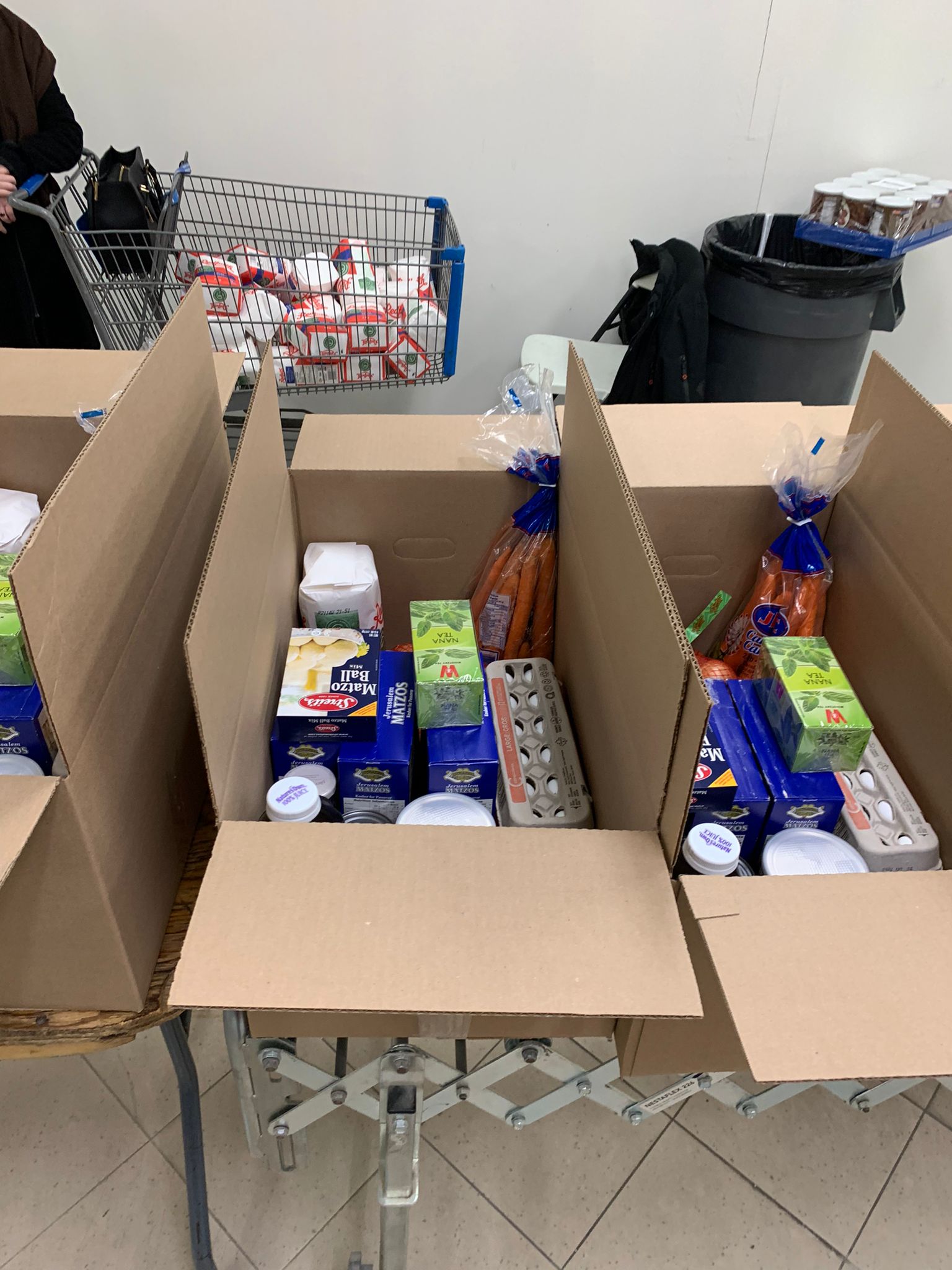“Macaroons?” “Got it!” “Ok, here we go: strawberry jam!”
That was the scene in the main hall of Toronto’s Lipa Green building on Sunday, April 3, where hundreds of volunteers, including Canadian Members of Parliament, spent the day packing Passover food boxes for the city’s needy.
The boxes were destined for 1,000 clients of the UJA Federation’s various Jewish social services agencies, where they would be distributed in time for the start of Passover this Friday. Fresh meat and perishables will be delivered separately.
The pandemic and the rising cost of food have made the need jump by about 20 percent this year from last, according to organizer Romy Pilarski.
“As the months and months have gone on, people that have been sick may not have been able to return to work, and lives have been thrown upside down,” Pilarski said, as she held a clipboard with a checklist of 30 grocery items included in each Passover box. “So what we’ve seen is that the needs keep rising and the numbers of families that are suffering from hunger are going up and up.”

Pandemic needs spike in 2022
The jump in need is being seen across Canada.
Calgary is where 55 families will receive free Passover food bags, up from 46 last year.
Lisa Thomson of Calgary’s Jewish Family Service said students from the Calgary Jewish Academy decorated the bags. Then a three-generation team of mother, daughter and grandson assembled the packages on March 16.
“Packages go to clients who are low income, struggling financially, or are isolated, and wish to celebrate Passover—this includes families, individuals and older adults/seniors,” Thomson wrote in an email to The CJN.


Montreal is where the MADA Community Centre prepared 2,000 Passover boxes of staples, including fresh carrots, Kedem grape juice, matzah, and a bag of onions. While that number is about the same as last year, the kitchen is expecting to serve 7,000 to 8,000 home-cooked meals during the eight days of Passover.
“These are aimed at elderly people, and people who are not mobile, or live with disabilities,” said Elyssa Stock, MADA’s marketing director.
And for the first time in two years, there will be 10 different free community seders offered to clients in and around Montreal, who have no place to go.

Vancouver is where Jewish Family Services has prepared 585 food boxes this year, also a 20 percent increase over last year. Added to this is a new initiative to send 225 Seder packages for seniors who may “still be feeling reluctant to socialize after the social isolation caused by COVID-19,” according to Grace Miller-Day, with the Jewish Federation of Greater Vancouver.
This Seniors Services Seder Plate initiative is being rolled out with the help of Chabad BC, and will give the clients everything they might need, including shemurah matzah, cards and seder plates made by day school students.
“Plus horseradish, charoset, grape juice, candles and dried fruits and nuts,” she added.
The city’s Schara Tzedeck synagogue plans to pack and deliver a further 550 seder meals to community members on Friday April 15, according to Rachael Lewinski, the director of community engagement.
Toronto is where, aside from the UJA Federation’s 1,000 boxes, the Chasdei Kaduri Kosher Food bank has prepared two separate shipments for their clients’ Passover needs. According to the executive director, Jonathan Tebeka, the first delivery is dry goods, while the second is only perishables.
“The boxes are not just ‘Seder’ boxes as they are not just meant to be a symbolic gesture—they are actually meant to feed entire families over the span of a very long holiday,” Tebeka said.
No volunteers: National Council of Jewish Women Toronto

While many Jewish agencies felt comfortable enough to hold in-person events to prepare the Passover hampers, that was not the case for the 39th annual National Council of Jewish Women Toronto’s Passover Food Drive. Several months ago, with the resurgence of the pandemic, organizers cancelled the popular community tradition and pivoted.
For the second year in a row, they hired a packing company and a logistics firm to do all the work, instead of relying on teams of volunteers to pack and deliver the donated food.
“This way, our volunteers are well protected,” explained Shelley Feldman, in an interview with The CJN Daily.
Earlier this month, the NCJWT Passover boxes were delivered to approximately 2,000 Jewish clients in Toronto, including Holocaust survivors, and seniors, and others whose names were provided by Jewish social services agencies. The number is 17.6 percent higher than in 2021, when they sent out 1,800 boxes at Passover.
Now, the organization is appealing for financial help via donations to help cover the added cost of this year’s drive, which will hit $200,000. The hiring of a packing and a logistics firm added between $40,000 and $50,000 to the cost, Feldman said.
The charity is facing extra costs not only from using companies instead of volunteers, but also the price of food has gone up tremendously, she added.
Potholders add a personal touch

Aside from the food, half of the clients who receive NCJWT Passover boxes will be getting a hand-made potholder this year. It’s the result of two years of crafting by members of the Toronto Jewish Quilting Project.
Eva Karpati assembled the fabric and other necessary materials in kits, and then arranged for her members and high school students to sew 1,000 of the colourful gifts.
“We thought it would be a perfect project for us because it’s a complete quilt, except it’s six inches as opposed to a full lap-size quilt,” Karpati said.
She taught the students how to make the potholders over Zoom. It required nine hours of instruction.
“They were really touched to be able to do something like that,” she said. “So it’s a real community endeavour.”
The other 1,000 boxes will receive a small gift courtesy of Chabad.









